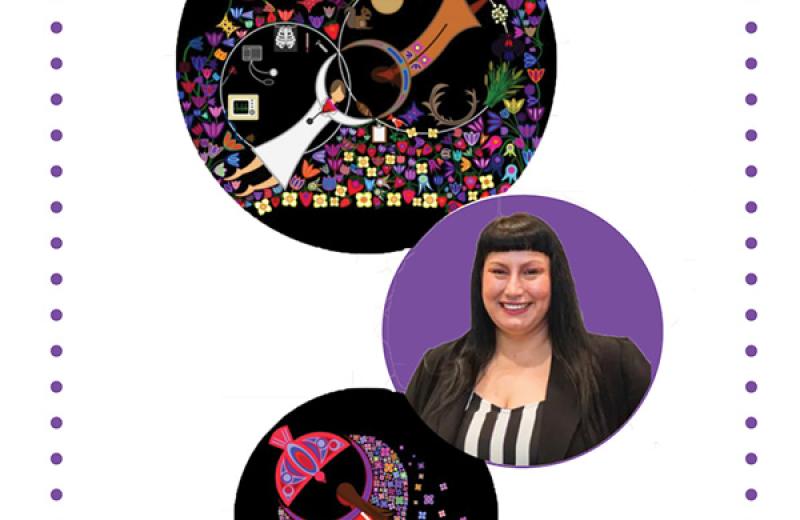Lisa Boivin, a member of Deninu Kue First Nation in the Northwest Territories, completed her Doctoral Studies at the Rehabilitation Sciences Institute within the University of Toronto’s Faculty of Medicine. Her upcoming workshop called Creating Visual Narratives of Care and Cultural Safety is coming to Prince George.
Lisa started drawing four years ago to help her get through her classes. During an interview with CBC’s Unreserved, Lisa remarked that her introduction to art isn’t as romantic as one would assume.
“There really is no long, romantic history of longing to learn how to paint – it was literally just hating what I was studying.”
After one of her professors expressed concern that her doodling was disruptive to the class, Lisa began to use digital painting apps on her computer – creating her signature style of using bright, vibrant colours on a black backdrop.
As a Sixties Scoop survivor, art soon became an even greater refuge for Lisa. The Sixties Scoop is a part of Canadian history when Indigenous children were taken from their families and adopted out to white families – some as far away as Europe.
As Lisa learned about colonialism, cultural displacement, and intergenerational trauma in the classroom, she was also reconnecting with her father and processing her own personal history. When it came time to submit an assignment, Lisa found that words were not sufficient to express what she had to say. Instead, Lisa asked if she could hand in an arts-based project. Feedback was positive from her professor. So, she continued using painting as a teaching tool.
Today, Lisa works as an arts-based health care educator. Using image-based storytelling (an Indigenous teaching style), Lisa educates current and future health care professionals on the obstacles that Indigenous patients face as they navigate the Canadian health care system.
Lisa’s presentation can be broken down into three sections:
- The first section provides a personal account of Canada’s colonial history as it relates to the health outcomes of Lisa and her family.
- The second and third sections include reflexive, arts-based exercises that use image-based story telling to explore nation building in the workplace and to create a visual narrative of the clinical and personal self.
The afternoon of learning will begin with a tour of the Two Rivers Gallery REDRESS exhibit, followed by a lunch for participants and Lisa’s three-section workshop.
Organized by the Health Arts Research Centre, with help from the National Collaborating Centre for Indigenous Health and Northern Health (NH), this free afternoon workshop takes place on Friday, October 4, 2019 from 12 pm to 4 pm at the Two Rivers Gallery. NH staff and physicians are welcome to register, but space is limited! Before registering, NH staff should discuss attending with their manager if this event takes place during regular work hours, or if coverage or travel would be required.














Comments